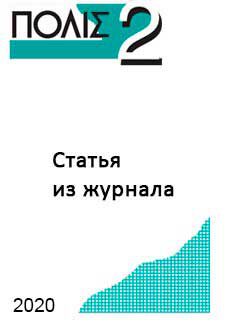Online shop of "Polis. Political Studies" Journal
We in the world, the world in us
Bederson V.D. Civil Associations and Political Regime in Global Non-Democratic Practice: Between Political Control and Social Efficiency. – Polis. Political Studies. 2020. No. 2. P. 37-52. (In Russ.).
Free!
civil society, civic associations, NGO, political regime, authoritarianism.
Regarding the balance between political control over civic associations and their social effectiveness (in using the functions of supporting the population and providing social services in undemocratic political regimes), this article aims to summarize and systematize the scientific literature and scientific discussion of this problem. The key theoretical and methodological directions and problems of civil society research in autocracies are considered. It is noted that empirical studies have accumulated considerable material analysing the specific mechanisms authoritarian regimes use to influence civil associations with a view to maintaining political control and ensuring social functions (cooptation, organizational and legal control, organizational and political control, quasi-non-governmental organizations), as well as into why civil associations are involved in supporting an authoritarian political order (access to limited resources, access to bureaucratic infrastructure, the possibility of consulting the authorities, the possibility of the manifestation of the rights of the target group). Studies on materials of Mozambique, Algeria, Ethiopia, Syria, Turkey, Kazakhstan, Uzbekistan, Russia, Jordan, Malaysia, Vietnam, China, etc, mainly carried out over the last 10 years, are analyzed. The problem that, in spite of considerable empirical material, non-democracies have not yet formulated a stable explanatory model or middle-level theory that would become conventional for these studies is discussed. Detailed consideration is given to how scientific literature answers the questions: why do authoritarian regimes need independent civil associations that can become triggers for democratization and/or political reforms; and for what reasons do independent associations participate in supporting authoritarian stability, despite the fact that the regime seeks to limiting independent civil activity? In conclusion, ideas are advanced on promising directions both in the theoretical-methodological and empirical development of studies of the dynamics of relations between authoritarian regimes and civil society institutions.
 English
English Русский
Русский

Reviews
There are no reviews yet.